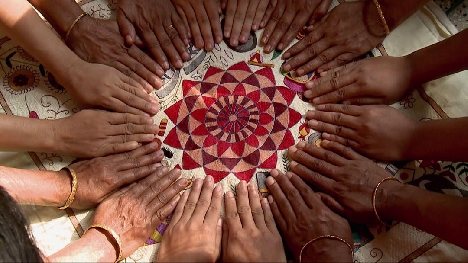The Subir and Malini Chowdhury Center for Bangladesh Studies, the Textile Arts Council and the Phoebe A. Hearst Museum of Anthropology invite you for a movie screening of Threads, followed by discussion with the filmmaker, Cathy Stevulak and Dr. Sanchita Saxena, a scholar of labor rights in the garment industry, UC Berkeley, on the future of kantha embroidery and the economic challenges faced by women artisans in the era of global fashion.
_________________
DATE: Sunday, March 14, 2021
TIME: 1 pm (Berkeley) | 8 pm (London) | 1 am (Pakistan) | 1:30 am (India) | 2 am (Bangladesh) | Calculate Your Local Time
UC Berkeley Student Discount: If you are a UC Berkeley student and the ticket cost is a barrier to your attendance, please contact isas@berkeley.edu by Wednesday, March, 10, 2021.
This event will also be live streamed on the Center's FB page: ChowdhuryCenter
_________________
Program overview:
Kantha embroidery started as an intimate artistic work done at home by recycling old sarees and other clothing. The birth of the country of Bangladesh 50 years ago and the movement to create a national identity energized local artisanship, including the art of kantha. Women came together for economic and social opportunity producing many forms of craft, and kantha found its way from private settings to public view.
The rise of garment factories in Bangladesh starting in the 1980s impacted the once flourishing indigenous arts. Thousands of looms went idle in rural areas, and kantha makers had to choose between continuing their tradition and making factory clothing in the cities for a livelihood. The uptick trend of fast fashion, such as H&M and Zara, created a power imbalance between international buyers and local producers.
With Covid, this trend is reversing. The closure of factories caused a massive out-migration from the cities to villages, and many people working in the garment industry lost their jobs. Todays discussion will address the future of kantha embroidery and women artisans in Bangladesh, and the bigger question on how to preserve indigenous arts and create a sustainable future for artisans in the era of global fashion.
About:
THREADS is an award-winning 30-minute documentary that tells the story of a Bangladeshi artist who frees herself and hundreds of others from economic and social hardship by re-imagining the ancient art of kantha embroidery. For background on THREADS, see www.kanthathreads.com.
Cathy Stevulak is a filmmaker and international program consultant. Her interest in textiles and the advancement of artisan enterprise, particularly in South Asia, led her to direct and produce the award-winning film, THREADS. She screens and discusses the film internationally in cooperation with universities, museums and community organizations. Stevulak co-authored with Dr. Niaz Zaman The Refining of a Domestic Art: Surayia Rahman, a complement to the story of THREADS that she presented at the Textile Society of America Symposium. Prior to becoming a filmmaker, Stevulak lived around the world while working with United Nations Development Program in Bangladesh, Canadian International Development Agency, NATO and CARE. She is interested in sustainable fashion and its relationship to human development.
Dr. Sanchita Banerjee Saxena is the Executive Director of the Institute for South Asia Studies (Institute) at UC Berkeley and the Director of the Subir and Malini Chowdhury Center for Bangladesh Studies under the Institute. She is also a lecturer of responsible business at the Haas School of Business at UC Berkeley. Dr. Saxena is the editor of Labor, Global Supply Chains, and the Garment Industry in South Asia: Bangladesh after Rana Plaza (Routledge, 2020) and author of Made in Bangladesh, Cambodia, and Sri Lanka: The Labor Behind the Global Garments and Textiles Industries (Cambria Press, 2014). She has been a Practitioner Resident at the Rockefeller Foundation's Bellagio Center in Italy and a Public Policy Fellow at the Woodrow Wilson International Center for Scholars in Washington D.C. She currently serves on the BRAC USA Advisory Council. She frequently gives invited lectures and publishes commentaries in the popular media. Dr. Saxena holds a PhD in political science from UCLA.
Sponsors:
This program is co-organized by the Textile Arts Council of the Fine Arts Museum of San Francisco & the Phoebe A. Hearst Museum of Anthropology in collaboration with the Chowdhury Center, UC Berkeley. The program is partially supported by Ellin Klor & Callista Jerman and the Tracing Patterns Foundation.
Fees:
$5 for TAC members and UC Berkeley community
$10 for general public
_________________
Like us on FACEBOOK
The event is FREE and OPEN to the public.

